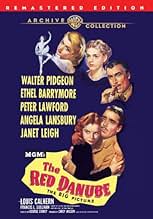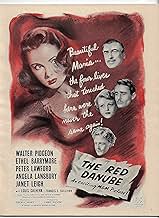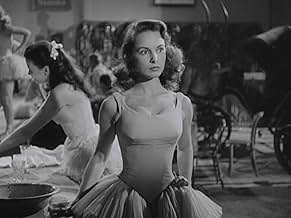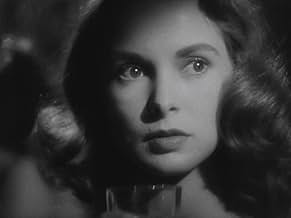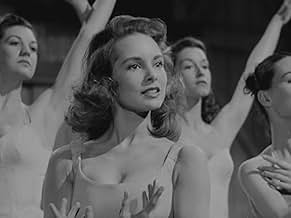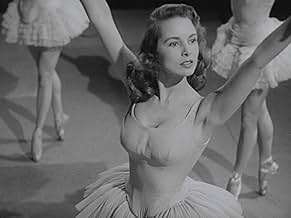Adicionar um enredo no seu idiomaShortly after the end of World War II, British Colonel Michael S. "Hooky" Nicobar (Walter Pidgeon) is assigned to a unit in the British Zone of Vienna. His duty is to aid the Soviet authorit... Ler tudoShortly after the end of World War II, British Colonel Michael S. "Hooky" Nicobar (Walter Pidgeon) is assigned to a unit in the British Zone of Vienna. His duty is to aid the Soviet authorities to repatriate citizens of the Soviet Union, many of whom prefer not to return to their... Ler tudoShortly after the end of World War II, British Colonel Michael S. "Hooky" Nicobar (Walter Pidgeon) is assigned to a unit in the British Zone of Vienna. His duty is to aid the Soviet authorities to repatriate citizens of the Soviet Union, many of whom prefer not to return to their home country. Billeted in the convent run by Mother Auxilia (Ethel Barrymore), Nicobar, a... Ler tudo
- Direção
- Roteiristas
- Artistas
- Indicado a 1 Oscar
- 5 vitórias e 1 indicação no total
- Lt. Guedalia-Wood
- (as David Hydes)
- Major
- (não creditado)
- Devout Pilgrim
- (não creditado)
Avaliações em destaque
There are several levels to this film. One is the agreement among the Allies to repatriate people to their native countries after the war. This film deals with the British sector, led by Pidgeon and his team, who are charged with aiding in the repatriation. Another level is the spiritual aspect - the Pidgeon character, "Hooky" Nicobar, has begun to doubt the existence of any entity that could allow such horror to happen in the world, including his own personal tragedy. And there's the love story between Maria (Janet Leigh), a Soviet ballerina, and Major 'Twingo' McPhimister.
When displaced Russians would rather commit suicide than return to Russia, Hooky begins to doubt what Colonel Piniev (Louis Calhern) is telling him about what awaits these people back in the homeland. But he has to follow orders, so in spite of protests, he turns over ballerina Maria to the Soviets.
MGM made a film later on, "Never Let Me Go" about a ballerina trying to get out of Russia; here a ballerina tries to keep from going back. This film has much more depth than "Never Let Me Go," and is more gritty, showing the old and weak DPs, unusable for slave labor, that the Russians foist upon the British sector toward the end of the film.
The spiritual angle in this film is interesting - has God failed man, the nun (Ethel Barrymore) asks, or has man failed God? Is "following orders" when you know you're sending people to certain death sufficient? "The Red Danube" is well acted. Discovered by Norma Shearer, Janet Leigh had only been in films two years when she made this, but she had already racked up some experience. She's fresh-faced, sympathetic, and sweet as Maria Buhlen. Peter Lawford doesn't have much to do; Angela Lansbury is delightful as part of the team, and Walter Pidgeon does an excellent job as the troubled colonel. As the Mother Superior where Audrey Quail, the colonel, and Twingo are billeted, Ethel Barrymore gives a superb performance as a woman of implacable faith who tries to help Hooky with his crisis and aid Maria.
I thought this was a very good film, thought-provoking, with good direction by George Sidney.
The following comments by "choosy" (from Seattle WA US) are, for the most part, accurate: "The other comments miss the point completely--the focus in the novel was not Cold War propaganda but the facts of the insane policies of the US and British in their respective zones of occupation in Germany and Austria to forcibly remove or return Eastern Europeans, not just Soviet citizens, even including ethnic Germans, most of whom had endured untold horrors trying to escape to the west, safety, and 'freedom' at the end of the war. That was the bemused Walter Pigeon's problem, not 'war guilt' but having to 'obey orders.' " (...AFTER the war.) "Most expellees were anti-Soviet, which is why they had escaped to the west to begin with, and thus went back to a certain death. It wasn't a small part of history--it was one of the biggest Allied mistakes and betrayals, and there were many, of the Occupation."
Here "choosey" has a reasonably solid handle on events, regardless of the novel or the movie. But the following of "choosy's" comments are off-base, primarily because he does not consider the whole picture. "The fact that this forceful expulsion was done because the Allies a. did not want to feed and care for refugees, and b. did want to curry favor with the Soviets at that pre-Berlin Blockade period makes the history even more poignant." The US Army (including the British Army) at that time was actually TWO armies in transition, as the combat forces who had fought their way across Europe to war's end gradually turned their functions and responsibilities over to a fresh Occupation Army - fully prepared to address whatever was needed in the immediate post-war period in their respective zones of responsibility. Not wanting to feed or care for the refugees or concern about currying favor with the Soviets simply did not enter the equation, nor was there any need to; this is pure revisionism. There were diplomatic protocols signed by the highest levels of all involved governments before the war ended; it was the duty of the soldiers of those respective governments to comply with those protocols, most of which at the time they were signed had solid rationale.
The policies mentioned in "chosey's" comments above were, in fact, in full agreement with procedures to which the Allies (US, GB, France and Russia) had worked out prior to the end of the war. Similar procedures were required of the Russians in repatriating "displaced citizens" to their proper homes in the west. Russia was seen during the war as a co-equal partner in the overall war effort on the European continent, and US combat forces (Patton's army), in fact, actually withdrew from forward positions they had reached in Austria and Czechoslovakia so that those regions could be turned over to Russian forces as per previous agreement concerning post-war occupation. (The US and UK could not have won the war in Europe without Russian participation, but all nations always exact a price for their cooperation. Russia under Stalin was no different.)
It rapidly became apparent, however, that Russia and its military, if not its political leadership, had very deep-seated scores to settle with those population groups who were seen as having fought against Russian forces, and thus had caused such horrendous spilling of Russian blood. (Probably the most confusing group was the Ukrainians - who had repeatedly been forced to turn and fight their previous "partners", back and forth, and even each other, during the ever shifting circumstances of the war in the Ukraine.) Russian rule in the zones over which they had control after the war very rapidly became quite ruthless, and it quickly became apparent to everyone that the KGB was, in fact, calling all the shots. There is also considerable evidence that the KGB was executing policies dictated by Stalin himself. Still, US and British military personnel stationed adjacent to the Russian zones or as liaison personnel were required to assist with the "resettlement" or "repatriation" procedures - which caused considerable internal turmoil among those men that lasts to this day.
On the other hand, there were also (fewer) numbers of people we were trying to repatriate from the Russian zones in the East to their proper homes in the West, including those warehoused in concentration camps and prisoner of war stockades. In order to accomplish that, we had to demonstrate some degree of reciprocity.
These things were, and remain, simple facts of history. War, and its aftermath, is rarely as neat and tidy as after-the-fact armchair generals would prefer. War is always, at best, a series of compromises and constantly changing circumstances. The procedures depicted in the movie had nothing at all to do with "feeding the red scare, the rise of McCarthyism, or as propaganda" to use somewhere else in the world. These days we ALL seem to use events for our own particular agendas, simply by putting some twisted ignorant spin on them, or by creating asinine cause-and-effect scenarios to best suit our own purposes. No one stops to consider that any two-bit twit can throw cheap stones from the very safe sidelines, and what is safer than the distance of a half century? But, in the end, facts are facts. The major events shown in the movie happened. Do with them what you will, but I prefer to keep them as they actually were - simple reality, facts of life, consequences of war.
As a life-long intelligence/liaison/diplomatic ground force professional, veteran of several wars, student of military history, who also served in Occupied West Berlin for five years watching good people die trying to get over The Wall to the West, I am .... Old Soldier
Você sabia?
- CuriosidadesIn 1946, Angela Lansbury appeared in As Garçonetes de Harvey (1946), which features the song "The Atchison, Topeka and the Santa Fe." In this movie, she appears in a scene in a bar where the band can be heard playing the song's music.
- Erros de gravaçãoMelville Cooper's role is credited as "Private David Moonlight", but his uniform bears Sergeant's stripes throughout the movie.
- Citações
Mother Superior: [Referring to a previous conversation about religion and its inefficacy in wartime] Like that ladder...
Col. Michael S. 'Hooky' Nicobar: The ladder?
Mother Superior: There is the ladder, there is the ceiling and there is the paint. If you want the ceiling painted, someone must climb the ladder.
Col. Michael S. 'Hooky' Nicobar: Yes, you, um, need a painter.
Mother Superior: But suppose the painter remains at the foot of the ladder? You cannot say that the ladder has failed you, or the paint has failed you, or the ceiling has failed you.
Col. Michael S. 'Hooky' Nicobar: No, no you can't.
Mother Superior: I know about you more than you know about yourself. You want the ceiling painted but... all the cruelty in the world, all the horror and tragedy you see, these you do not oppose with your own courage. You do not try to replace them with your own high hopes for the world and the human race. You complain that God has failed you. No, my friend. God has not failed man- man has failed God. For every man knows what God wants him to do.
- ConexõesFeatured in Some of the Best: Twenty-Five Years of Motion Picture Leadership (1949)
- Trilhas sonorasOn the Atchison, Topeka and the Santa Fe
(uncredited)
Music by Harry Warren
[Instrumental version played at the tavern in Rome when Audrey and Twingo say goodbye]
Principais escolhas
- How long is The Red Danube?Fornecido pela Alexa
Detalhes
- Data de lançamento
- País de origem
- Idiomas
- Também conhecido como
- O Danúbio Vermelho
- Locações de filme
- Roma, Lazio, Itália(backgrounds)
- Empresa de produção
- Consulte mais créditos da empresa na IMDbPro
Bilheteria
- Orçamento
- US$ 1.961.000 (estimativa)
- Tempo de duração
- 1 h 59 min(119 min)
- Cor
- Proporção
- 1.37 : 1



